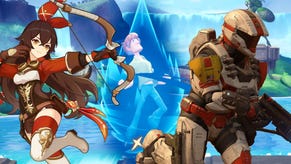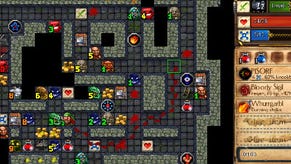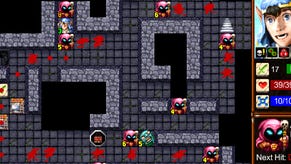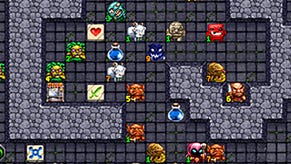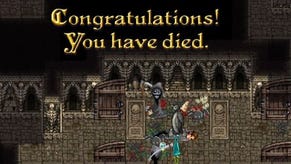Interview: Where Next For Desktop Dungeons
Desktop Dungeons: an incredibly smart roguelike, which takes 10 minutes to play and turns roleplaying into something akin to a puzzle game. We went slightly bananas over it last year.
Desktop Dungeons: a game ripped-off shamelessly and sold for profit by someone else. Following an attempt to buy the DD devs off with a free iPhone (!), clone-game League of Epic Heroes finally panicked in the face of DD's lawyers and disappeared from the App Store. There ensued a web-wide argument about plagiarism/inspiration.
Suffice to say it's been a strange year for South African studio QCF Design. Seems like a good time to chat to their boss Danny Day about just what happened, the curious moral debate around game-cloning, the welcome resurgence of roguelikes - and what comes next for DD now the dark doppelganger's out of the picture.
If you're not familiar with DD, go play it. It only takes ten minutes (though you'll probably then go play it dozens of times. It's good like that). If you're just too grud-darned lazy even for that, watch this video from the devs:
Now, on with the interview...
RPS: Just to clarify what actually happened, as not everyone necessarily went through the timeline: what makes the Desktop Dungeons/League of Epic Heroes situation different than "one game threatened legal action at another game for being similar"?
Danny Day - If you were to paraphrase it, that's probably what it would end up looking like. Obviously we'd argue that "similar" isn't nearly the half of it, although a few things make what went on here a little different to what usually happens when someone copies another developer's game.
We were actually in contact with our cloner: [LoEH dev] Eric Farraro emailed us after he saw that we'd seen his gameplay videos via twitter. A month-long email exchange of extreme weirdness started with him explaining how it was ok that he'd duplicated DD exactly because he hadn't quite duplicated all of it. That was important, as was making references to copyright and giving credit because he thought it was a great game. We tried to explain why we thought that the direct copying wasn't quite cool and suggested a host of things that LoEH could do differently in order to explore the game-space that DD was merely part of instead of going where we'd already been.
We felt pretty third-worlded after Farraro offered (completely unbidden, by the way) to buy what essentially amounted to the rights to DD for the cost of an iPod. We realised that this probably wasn't going to work out nicely for us, this guy wasn't someone we could talk to as friendly devs all trying to make fun games. So we gave up, spoke to a few lawyers and went back to work on DD twice as hard as before. That culminated in the most pissed off we've been in ages as we wrote that list for our lawyer:
9e. Fighter (DD) attributes * INSTINCTS: Monsters of an equal or lower level always have their locations revealed * VETERAN: Fighters earn 1 extra experience on any monster kill * PIT DOG: Dungeon runs start with 1 level of standard Death Protection on the character vs Hunter (LoEH) attributes * Hunter's sense: Can see equal level enemies * Veteran: +1 XP per kill * Battle Hardened: You can Cheat Death one time
And LoEH was just "inspired by"? It was page after page of this. Utterly maddening...
I think it's important to point out that going legal wasn't a strategy for us, we weren't relying on the letter being effective and at no point were financial damages mentioned. Our plan was simply to make DD as good a game as it could be and preferably to have LoEH be a different game in the puzzle roguelike genre (or whatever it is people have decided to call DD these days) one that we could play too. Once things get legal, they move away from ideal solutions and toward absolute "thou shalt not" situations quite fast. Having to start thinking about the implications of cloning was a result of that, but now that we have, we're amazed at how accepting some people can be of practices that don't seem in any way sustainable for the games industry as a whole.
RPS: Why do you think Farraro backed down rather than went the distance, given he'd previously sounded so sure he was in the right? And how confident were you that the law was on your side?
Danny Day - We have no idea... It does seem like a complete turnaround compared to his stance in the Edge article, but he didn't seem quite as confident all the time - the iPod offer in return for no legal action, etc. There's been speculation in comment threads that he realised the game wasn't going to sell much anymore or get good reviews, or that it would simply be too much work for him to fix the bugs that people were complaining about, or maybe Apple even blocked an update that he was trying to release. We don't know what Apple sent him, only that it also included our lawyer's letter to Apple itself. Like we said on our blog, it simply doesn't make sense to increase the risk to your game by knowingly running head first into possible IP snafus without knowing exactly what you're doing.
Just like nearly everyone else on the net, we're not lawyers. We approached a few people for legal advice when our friends pleaded that we at least see if we can do something, probably because they were getting sick of our bitching. You'd be amazed how many lawyers, even IP specialists, treat games as though they're completely devoid of any merit at all: "Aren't all games just copies of Pacman anyway?" We ended up finding someone that understood gaming a little, but it wasn't the gameplay videos that convinced him there was a case, it was Farraro's emails to us. Based on his say so, we wrote as close to an exhaustive list of every instance where LoEH directly copied DD as possible and he couched that in legalese before lobbing it at Apple. He even offered not to charge us if the letter didn't achieve anything... I guess the advice to budding young cloners then is to plead the fifth?
RPS: There's been this counter-argument that game-cloning has, does and will happen, to a greater or lesser degree, all the time, and could even be thought as playing a part in gaming's advancement. Is there any sense in which you agree with that sentiment?
Danny Day - No, that sentiment doesn't make sense. Firstly, arguing that something already happening removes its wrongness is, quite frankly, bullshit. Pick any example of otherwise accepted behaviors being re-evaluated by societies and eventually changed: Slavery, dueling, insider trading, etc. Maybe our experience as South Africans, living in a society where people literally said "no more" and changed everything, makes that more obvious for us - but it's not hard to see when arguing legalities and precedence over what people find acceptable and sustainable is a bankrupt stance.
Secondly, how is blatant cloning supposed to advance gaming as a whole? Does anyone remember a clone that actually did so? There's a really good comment on our blog that relates cloning and being inspired by games to painting. The argument is that painting shares several elements as a discipline, some are technical - brushes, paints, what you paint on - and some are stylistic movements like realism, cubism, etc. The difference between someone adopting a cubist style and actually forging a painting is enormous. It simply seems that in the creative space of games we haven't had the discussions we need to be having to be able to draw those strong distinctions.
Part of the problem is legal: people assume that laws trump all, instead of understanding that the current laws that "protect" games weren't built to do any such thing. The way we talk about the legalities of games needs to change, both to prevent blatant cloning (someone stealing your product and then selling it at a reduced price because they didn't need to pay as much to build it isn't competition, it's theft) and to stop Langdellian trademark trolling ("I totally came up with this idea for a name first, watch me lie to prove it! Now gimme money!"). We're anal about names thanks to forgery: I can't pretend to be Picasso and hope to get away with it.
About the only good thing you can say about clones, if you're dead set on being an amoral corporate-type, is that they increased liquidity in the games industry. A successful clone is one that targets a platform or market that hasn't been reached by an original: You could sell a forged painting in a South African auction house easier than you could sell one at Sothebys in London. Thus more people are spending money on the medium, theoretically. The reason we said increased liquidity - past tense - is the same reason that forging paintings is no longer lucrative, communication infrastructures destroy the isolation that prevents originals (or knowledge of originals) from reaching markets.
This is an area that people need to talk, fight and think about more, not shut down with short-sighted aphorisms and "Well that's how it always has been".
RPS: How's it going to affect your future development projects? Does it mean you'll be fearful of free, experimental games in case someone rips you off and gets something on sale before you can?
Danny Day - Well, now that people know we've got a crack team of highly trained legal operatives ready to launch from orbit at a moment's notice, we suspect people might think twice about cloning our next awesome project..
Realistically, we don't want to change our development habits. DD is a much better game because it's been a free alpha. It simply wouldn't be in the same place it is now if it hadn't been available for people to play and enjoy and tell us where we'd made stupid mistakes (see the first incarnations of the Vampire). Bouncing stuff off players is a great way to make games. If we want to keep innovating, that's what we have to do. What most players don't realise is that we view the freeware version of DD as a playable prototype- it's there to be played so we can learn from it.
What we are going to change is how long it takes us to move from our initial prototypes to a full version people feel happy paying for. Changing what you're developing in is a lengthy process, especially when you have to learn a new set of tools and engines, just ask anyone who's touched DNF.
RPS: So what is next for DD, on a content and tech level? What does the planned Unity version hold? Specifically on PC - are you laser focused on iPhone now, or are us lot going to see plenty of updates, and maybe even a full-on, paid version, too?
Danny Day - Wow, where to start? The game's progression system is very different now: Players manage a Kingdom that's essentially reliant on a non-stop stream of adventurers willing to risk life and limb for fame and fortune. It's a bit of a parody of what tourism would look like in a swords-and-sorcery fantasy setting with modern commercialism. Every time you successfully bring back a boss monster's head from a dungeon, the Kingdom earns gold that you can spend to buy new buildings or unlock new classes and what we've artfully named "preparations".
Preparations can be bought before you enter a dungeon with a new adventurer and do things like swap health bonuses for extra mana upgrades, allow you to summon a shop at will or start out with a wand of confusion, that sort of thing. Obviously there's a lot to balance there, so we've got a lot of testing ahead of us as we start adding those in.
Something else new that we haven't really talked about much before are the sub-dungeons. We're putting little mini-dungeons in the randomly generated dungeons for players to find, they might be quest encounters, extra boss battles or just rooms filled with treasure or a mad god. Anything we can come up with, essentially. We're enjoying the idea of adding scripted types of event to an already randomly generated scenario.
Unfortunately the freeware isn't going to be seeing any updates, we're pushing hard to get the full version out on PC/Mac, then polish it for iPhone and hopefully Android after that. It makes the most sense to come out on PC first: This is where everyone's been playing the game already and don't expect to pay $1 per game. We have to hit the App Store, it would be silly not to, but it's always best to do that when you've got as much buzz as possible so you have your highest chance of getting into the top-seller lists.
RPS: Did you make the game expecting it to be something you could sell, or was the appreciation for it when it came out a grand surprise?
Danny Day -A complete surprise. The first version of DD emerged from Rodain's head in about 48 hours, he put it online so that he could get some feedback and see what people thought of the game. We realised it was something pretty special right away, so we started grooming the game for eventual release within the first few days of it blowing up. The timing was a little too perfect though: We'd just decided that we'd got enough saved up in the company to let us self-fund something for a year - try to get away from work-for-hire and see what we could do when left to our own devices. Having our first revenue project blow up into something like Desktop Dungeons has been great.
At first we had no idea how we were going to get the full game out, but one day we got an email filled with Popcap's feedback on the game. Reading "Everyone here at Popcap's been playing Desktop Dungeons non-stop, great game!" totally made our week. While Popcap weren't super-keen on carrying the game (we asked), they did give us a lot of advice and were generally super friendly. I hope we get to buy Jason and co a beer or two at the GDC.
RPS: What's the major stuff you've learned as you've been developing it?
Danny Day - This is the first time we've worked with Unity, so we learned a lot about that and the differences in Mono compared to .Net in very specific areas. Unity isn't very geared up for procedurally generated content, so we had some mental gymnastics to do there. Generally though it's been more about learning the business side of games... We still feel like we're basically making it up as we go along, but somehow we're still going. So that's good.
Ideally we'd like to be able to take this experience of the little things that actually go into pushing a title out there, more than just building something people can play, and making that knowledge available to the South African game development community at large. Things like handling exchange control laws, local taxation vs international earnings and all that entertaining stuff. We'd like to be able to go to universities and say to the kids that just finished school or are starting out on the new game design courses: "Don't worry too much about getting hired by EA or Ubisoft overseas, here's how you can start up your own studio and make the games you want to make. This is the business knowledge you're not getting because you're nominally computer science students, this is how you entice artists to join you, etc." It's that generation that's going to produce the games that get played in Africa, the ones that really light this place up.
RPS: There seems to be a bit of a roguelike resurgence lately - why do you think that's happened, and where might it lead to?
Danny Day - It has a lot to do with procedural content generation. Roguelikes are a genre that most indies feel very comfortable with that offer almost the perfect intersection of value for player money in terms of play-time, vs developer budget and content production time. If you build a good roguelike, you know you're going to have people that play it for hours and hours, much longer than they would usually invest into a game in a different genre that cost the same to make. There's also a bit of a selection bias: We tend to call almost anything that generates content on the fly a roguelike game, so as more developers try to maximise their content budgets, we'll see more games that behave (at least partly) roguelike-like. Music games escape this classification, but they're popular among devs for similar reasons.
Roguelikes are also very good at generating word of mouth. Their players are fiercely vocal about just what it is that makes game X or Y awesome and why you should totally play it. We hate to social-media the interview, but as more people use more social communication mechanisms, the games that create the most loyal and vocal fans will start to seem like they're everywhere. How long has it been since you heard someone talk about Minecraft or Dwarf Fortress? How hard do you think you'll have to look to find a mention of ADoM, Nethack or DCSS in the comments on articles like this one?
We think it'll lead somewhere pretty cool. Truly unique game sessions are always a good thing, as is replayability. It also can't be too long now before someone figures out how to put roguelike systems into an MMO, producing what might well be the best game ever. Where grinding is replaced by permadeath, yet players return and keep paying their monthly fees to see if they can get just that little bit further with their friends next time, to see what new surprises they're going to find in place of the same old raids.

RPS: And finally, any idea what you might turn your attention to once DD's out the way?
Danny Day - ... Damn, we're all thinking about roguelike MMOs now.
Lots of people ask this, but the truth is that DD is still a pretty big amount of work. It's squatting on our work horizons, blocking out anything that might be behind it.
We'd always like to return to Spacehack, our DBP entry from 2008 that's been pretty well received, but there are always more game ideas. We're a little leery of being seen as "those roguelike guys", so we might wait a bit on Spacehack as it just happens to be our answer to "What happens if you try to make an action RPG/roguelike/SHMUP for consoles?".
We've been curious to see if there's maybe some room in the RTS genre for more fighting game mechanics, try to produce an RTS that's as pick-up-and-play as a brawler. Then again, we're playing a lot of Go at the moment, so maybe it'll be turn-based and deeply simple. Who knows?
We can say that you'll definitely be able to play a prototype of whatever we make next and help us decide if it's a keeper or not.
RPS: Thanks for your time.
Desktop Dungeons, the freeware edition, is available here.








